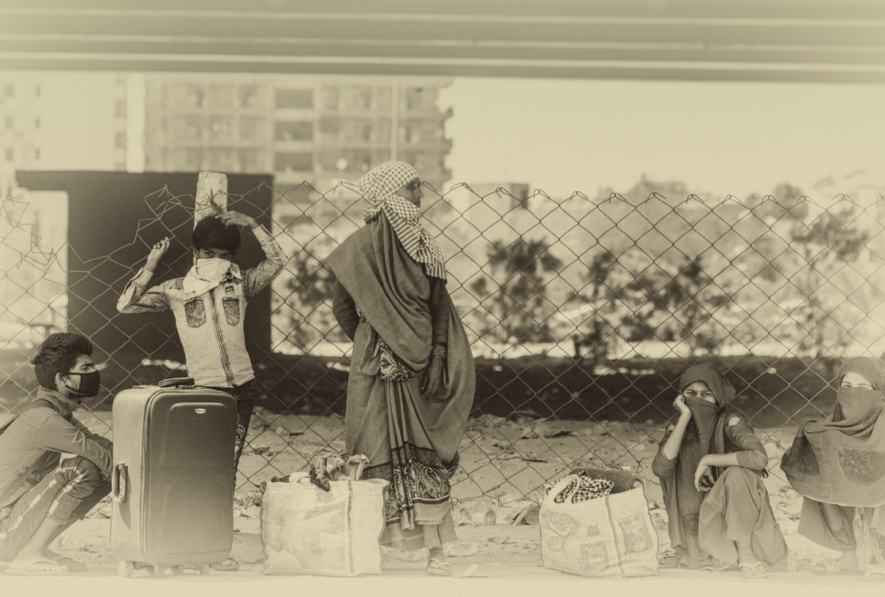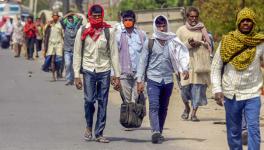Loss of Housing Played Key Role Behind Delhi’s Migrant Exodus: Report

On the eve of International Migrants Day, as commemorated by the United Nations on December 18 every year, the Housing and Land Rights Network (HLRN) released a new report highlighting that most migrant workers did not have access to ‘adequate housing’ in Delhi, as per international human rights law and standards. Moreover, loss of housing, due to inability to pay rent and forceful evictions, played a key role behind the exodus of migrant workers from Delhi during the coronavirus-induced lockdown.
Titled In Search of Home: A Study on Migrant Workers’ Access to Housing and Land, the working paper is based on the findings from interviews conducted with 248 migrant workers from Delhi who had returned to their villages during India’s pandemic-induced lockdown (March 25 to May 31, 2020).
Most migrant workers live in cities for a considerable period of their lives without access to adequate housing. The study finds that 75% of the workers lived in rented rooms in low-income housing or tenement while over 10% lived in jhuggi or slum-like settlements. As many as 44% of the participants had been living in Delhi for at least 10 years or more, with or without their families. “Over 56 per cent of migrant workers surveyed lived with their families in Delhi, emphasising the need for affordable housing suitable for families, with adequate space for children to grow and play, access to basic services, and protection of privacy,” the report said.
Even though the workers may not want to permanently settle in the city of their work, they need tenure security for rented accommodations, the report said.
The disadvantaged economic relationship between home-owners and tenants, and the inability of migrant residents to pay rent (due to loss of income), were key reasons behind migrant workers returning to their villages during the coronavirus- induced national lockdown, often at risk to their own lives.
Despite directives from the central government and repeated appeals from the Delhi government not to harass tenants and to postpone rent collection for a few months during lockdown, nearly 12% of the respondents indicated direct loss of housing, including through evictions by home-owners, as one of the main reasons for leaving Delhi. The testimonies received during this research study highlight several incidents of harassment of tenants by home-owners due to the unregulated nature of rental housing, absence of formal contracts, and the lack of tenure security. Nearly 16% of the study participants said they were harassed by home-owners for rent during the lockdown.
However, returning home wasn’t a solution for the poor workers. The majority of the survey respondents (56%) said they do not have access to much land in their villages. While land ownership is mostly joint, with large extended families, the size of land plots is small and not sufficient for cultivation of crops or sustaining livelihoods. Landlessness, thus, is a major challenge faced by rural people and a significant reason for their migration to cities.
Additionally, 66% of the participants cited loss of livelihoods as a key factor influencing their decision to leave Delhi, while 63% of the participants also mentioned lack of money as a severe challenge. Consequently, even in cases where migrant workers were not directly evicted, loss of employment and income meant that they would be unable to pay rent and afford housing in the foreseeable future. Thus, the prospective loss of housing, either from evictions or the inability to pay rent, was an important reason for migrant workers leaving the city
Speaking to NewsClick, Mansoor Khan, one of the members of HLRN, said, “The testimonies we received were harrowing – some had homes in the village but no land to cultivate and no source of income. One of the testimonies was particularly heart-breaking – a man had travelled all the way to his village, only to find out that he was not being recognised by his own family. Consequently, he returned to Delhi, without a roof over his head.”
The report has highlighted the need for a comprehensive right to housing policy aimed at providing affordable and adequate housing for all, with a focus on the most marginalised and excluded. The coronavirus pandemic has emphasised the critical importance of secure housing, (with access to essential services) health and the protection of life.
The report, based on its findings, suggested the imposition of a national moratorium on all evictions, including for inability to pay rent, and financial assistance to low-income communities to pay rent arrears.
Speaking to NewsClick, Shivani Chaudhry, Executive Director of HLRN, said, "The need for a home, for a place of one's own that gives one a sense of belonging and security, is so critical to human life. This study emphasises how migrant workers suffer from the absence of their own homes. They have been ignored consistently by the state, not only in cities where they work, but also in their villages. The complete lack of attention to their living conditions has been highlighted in our report, which also reveals how loss of housing, including eviction on account of the inability to pay rent, was responsible for their exodus from cities during India's coronavirus lockdown.”
Read More: COVID-19: Close to 20,000 People Forcefully Evicted from their Homes During the Lockdown
Get the latest reports & analysis with people's perspective on Protests, movements & deep analytical videos, discussions of the current affairs in your Telegram app. Subscribe to NewsClick's Telegram channel & get Real-Time updates on stories, as they get published on our website.
























